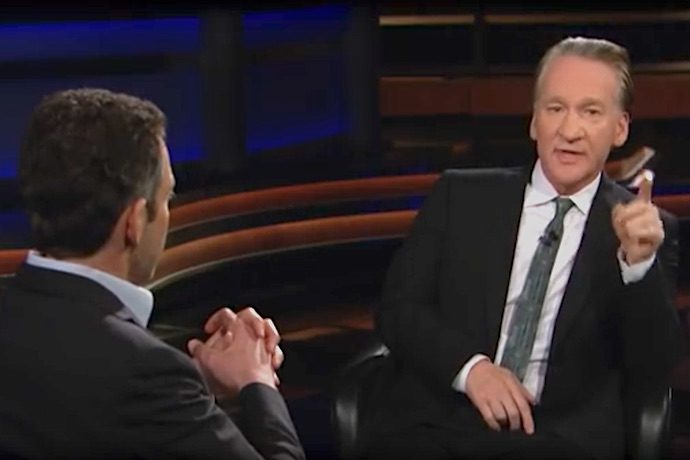Sam Harris recently appeared in a one-on-one segment on Real Time With Bill Maher to discuss Donald Trump’s immigration ban, which he criticized for being poorly executed and too sweeping, though he approves of the goal of keeping radicals out. Harris levied his familiar charge that the Left is an ally of Islamism because of its mindless commitment to multiculturalism and tolerance, which he’s been repeating since his 2004 book The End of Faith launched his career as an anti-religious crusader. These views were the basis of his highly publicized dust-up with Ben Affleck on the show in 2014.
It’s telling that the “alt-Right” (read: white nationalist) website Breitbart posted an approving summary of Harris’ comments from this Real Time appearance. Long before Trump’s travel ban, Harris was arguing that America should ethnically profile “Muslims, or anyone who looks like he or she could conceivably be Muslim” at airport security. Recent events should compel atheists to assess the impact of these views, proudly promoted by their exalted public representatives. I, like many other atheists who were optimistic about this movement’s prospects when it came alive about ten years ago, have been dismayed by how willingly some of its members subordinate reason to blind ideology.
Soon after Alexandre Bissonnette murdered six people at a mosque in Quebec City it was reported that “likes” on his Facebook page included Donald Trump, French far-right politician Marine Le Pen, and “atheist scientist” Richard Dawkins. The immediate reaction was to point to the toxic effect nationalists like Trump and Le Pen are having on our political culture, now materialized to tragic effect in what appears to be an ethnically motivated act of violence.
But these defenders of a white Christian vision of nationhood have found curious allies in celebrity atheists like Dawkins and Harris, who echo their paranoid views of Muslims to their ostensibly liberal supporters. Bissonnette’s actions and personal “likes” highlight the weird entanglement of atheists, Christian neoconservatives and theocrats, and far-Right white nationalists, which is something reasonable atheists should reflect on very seriously.
Given the trajectory of their intensifying assault on Islam—which is singled out as a uniquely barbaric religion—it should not surprise us when Dawkins and Harris share admirers with the likes of Trump, Le Pen, and other nationalists who are leading a crescendo of ethnic tension. While Dawkins, Harris, and other New Atheists (most famously the late Christopher Hitchens, also one of Bissonnette’s “likes”) have preached a secular gospel of scientific rationality and hostility toward religion, their harshest criticism has been reserved for Islam.
The ideological purity and relentlessly unthinking approach of people like Dawkins and Harris has resulted in disillusionment within the atheist community. Younger atheists who are intolerant of bigotry with respect to culture and identity have found Dawkins’ criticisms of feminism and his stereotypical depictions of Muslims as deranged religious fanatics unpalatable.
In January 2016, Dawkins was dropped (though eventually re-invited) as keynote speaker for the Northeast Conference on Science and Skepticism after backlash to his tweet promoting a proudly misogynistic and embarrassingly stupid YouTube video called “Feminists Love Islamists.” The incident highlighted the polarizing effect he has within the atheist community, which is struggling to stem a decline related to internal political tensions. The disappointing turnout for the 2016 Reason Rally in Washington, which failed to match the success of its 2012 predecessor, could only be considered a step backward for a movement with high aspirations.
But if atheists want to avoid fading back into irrelevance they would do well to consider what role they and their anointed leaders have played in the rise of a new global neo-fascist movement, which now counts the President of the United States among its leaders. The escalating tensions reflected in Alexandre Bissonnette’s terrorist attack show no signs of dissipating in a political climate where current and aspiring world leaders openly advocate racial discrimination. Atheists like Harris and Dawkins seem blissfully ignorant of the fact that the mass hysteria they have contributed to is precisely the effect that groups like ISIS are aiming for.
Harris and Dawkins claim that their issue is with the doctrines of Islam rather than with Muslims as people, but in practice they take little care to make a distinction, perhaps reflecting their general view that religion is a kind of mental parasite that takes control of its host. Whether intended or not, they have granted a veneer of intellectual legitimacy to ethnic nationalism and xenophobia. Harris has explicitly said that, in Europe, it is fascists who have the correct vision of how to deal with Muslims.
His general neoconservative position, like that of Christopher Hitchens, is representative of a wing of the movement that I call the “atheist Right”—the mirror image of the Christian Right’s militaristic nationalism and libertarianism. Atheists must consider whether the views of Muslims promoted by their most prominent representatives are helping or hurting the cause of secularism, given that anti-Muslim hysteria was so effectively harnessed by the Christian dominionists who have seized control of the American government through an uneasy alliance with a secular billionaire sociopath.
Thoughtful atheists have been pointing to the dangers of slipping into Islamophobia for some time, but the issue has reached a critical point in light of recent events. Many atheists see the likes of Dawkins and Harris as principled crusaders for science, reason, and a secular worldview. But to others their words can easily be heard as affirmations of intolerance and bigotry.
There’s no way to be certain of Alexandre Bissonnette’s beliefs regarding religion as his Facebook likes included philosopher and Christian apologist William Lane Craig, along with a book entitled “The Amorality of Atheism,” in addition to the New Atheists. It’s reasonable to suspect that Dawkins and Hitchens appealed to Bissonnette not because of their atheism per se, but more specifically, because of their hostility toward Islam—a possibility that should not inspire sighs of atheist relief.
Just as Pew Research Center reports that, in a little over 2 years, we’ve moved from “cool” to “neutral” on its scale of Americans’ feelings, atheists are faced with a stark moral and strategic imperative: they must confront the darkness within their midst and recognize that demonizing a group that constitutes over a billion individuals is a path to chaos. Trump and Bissonnette are both agents and effects of this chaos. No one would claim that Bissonnette was motivated to murder specifically by Dawkins’ words, but the persistence with which he and other New Atheists have uttered these words has contributed to the dismal present condition.
Advocating for reason and respect for science is a worthy cause in a world being torn apart by racism, nativism, and a corporate power structure that will destroy anything that stands in its way. It’s entirely reasonable to be concerned about religious extremism, but the most visible spokesmen of atheism are throwing fuel on the fire. The narrative of secularism must be rescued from those who would allow it to serve as a tool of fascism.





